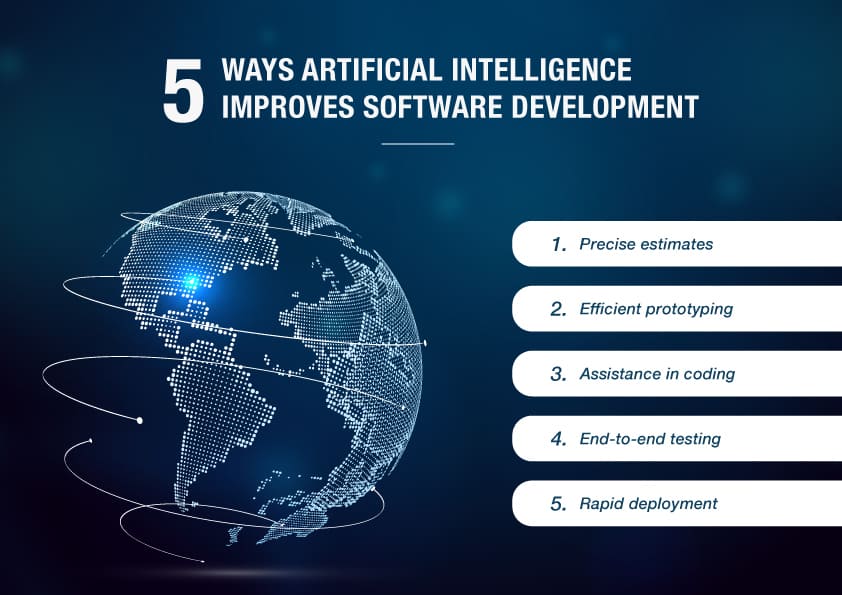Today, we are witnessing a global digital transformation where Artificial Intelligence isn’t just a secondary tool but a central cog in the wheel of innovation and efficiency. Now, one won’t be surprised by addressing the challenges of software projects with the help of AI. Agree?
However, it is still important to ask how we can make the best use of AI in our software development endeavors. The answer lies in treating AI not as a mere add-on but as an integral part of the development process. Whether you’re leading a team of seasoned developers or are part of a dynamic group of tech admirers, integrating AI into your workflow can be a groundbreaking solution.
With AI, you can turn the tide in your favor, transforming every challenge into an opportunity for growth and every project into a testament to efficiency. Let’s explore five actionable ways to smoothly adopt and promote AI software development process, ensuring your projects are not just delivered but are designed to stand out in the current highly competitive business market:
1. Optimizing project management
Project management is a critical component of software development. With AI, you can take project management to the next level. Think about the common challenges in managing timelines and resources. AI algorithm integrated with gantt chart is suitable for forecasting potential project delays by analyzing data trends. This predictive capability enables teams to make proactive adjustments, keeping projects on course. AI-driven tools also handle routine tasks such as scheduling and task assignments, allowing your team to focus on more critical development aspects.
2. Improving code quality through AI tools
The quality of code directly impacts the success of software. Here, AI can be an invaluable ally. Ever faced the daunting task of combing through thousands of lines of code to find bugs? AI-powered tools can perform this at a much faster rate, identifying errors and inconsistencies that might be missed by the human eye. These tools don’t just speed up the process but improve the overall reliability of your code.
3. AI in user experience design
User experience (UX) can make or break your software. AI’s role in designing a compelling UX is becoming increasingly important. By analyzing user data, AI can uncover patterns and preferences, informing a design that aligns with user needs. This data-driven approach to UX design makes your software more intuitive and boosts user satisfaction and engagement.
4. Enhanced testing and quality assurance with AI
Testing and quality assurance are the cornerstones of the high-quality software development process. AI transforms these processes by introducing automation and deeper analytical insights. Manual testing, while necessary, is often time and resource-consuming. At the same time, AI-driven testing tools automate repetitive tasks like regression and performance testing, expediting the process and ensuring complex coverage. Moreover, AI’s analytical capabilities can predict potential failure points, allowing teams to address issues proactively.
5. Continuous learning and skill development
In software, continuous learning is key. AI can be a powerful tool in facilitating this ongoing education. AI-driven learning platforms create personalized learning paths for team members based on their skills and learning pace. This customization makes skill acquisition more effective.
Final thoughts
Incorporating AI into your software development process is about more than keeping up with technological advancements; it’s about strategically improving and optimizing your team’s productivity and output. From streamlining project management to fostering continuous learning, AI offers a myriad of opportunities for improvement. However, it’s important to integrate AI thoughtfully, considering your team’s unique needs and dynamics. With a well-planned approach, AI can become a cornerstone of your software development success.
